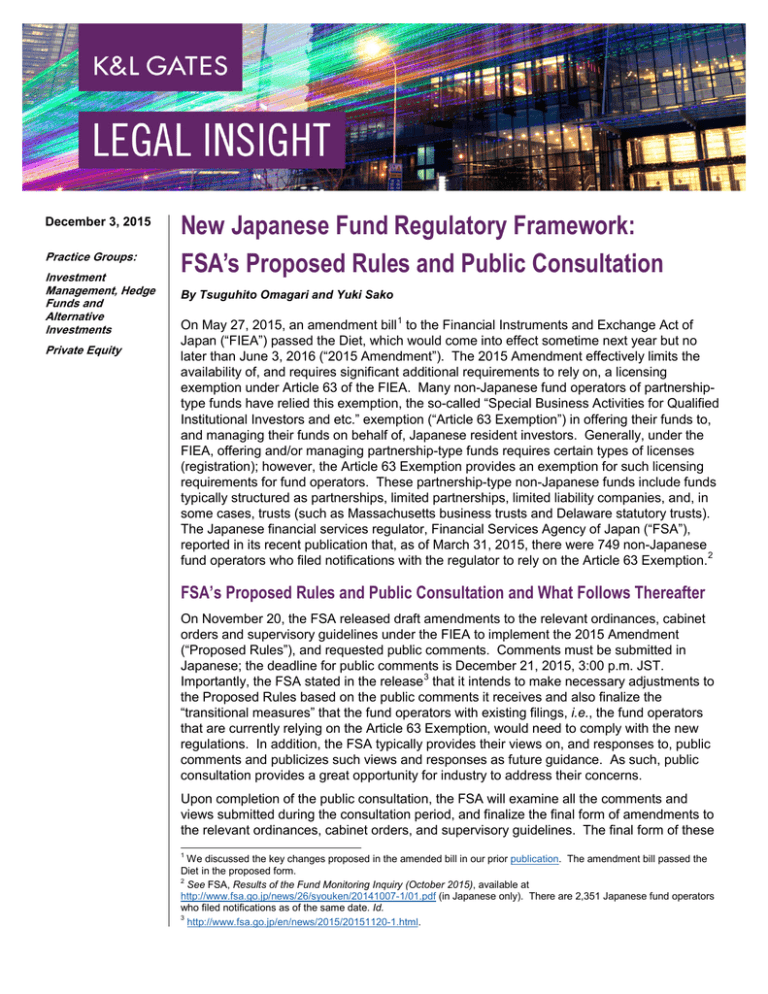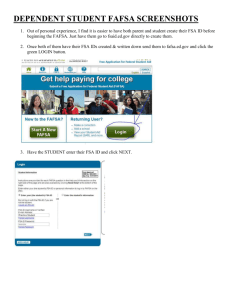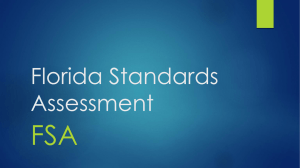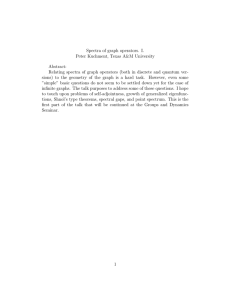
December 3, 2015
Practice Groups:
Investment
Management, Hedge
Funds and
Alternative
Investments
Private Equity
New Japanese Fund Regulatory Framework:
FSA’s Proposed Rules and Public Consultation
By Tsuguhito Omagari and Yuki Sako
On May 27, 2015, an amendment bill 1 to the Financial Instruments and Exchange Act of
Japan (“FIEA”) passed the Diet, which would come into effect sometime next year but no
later than June 3, 2016 (“2015 Amendment”). The 2015 Amendment effectively limits the
availability of, and requires significant additional requirements to rely on, a licensing
exemption under Article 63 of the FIEA. Many non-Japanese fund operators of partnershiptype funds have relied this exemption, the so-called “Special Business Activities for Qualified
Institutional Investors and etc.” exemption (“Article 63 Exemption”) in offering their funds to,
and managing their funds on behalf of, Japanese resident investors. Generally, under the
FIEA, offering and/or managing partnership-type funds requires certain types of licenses
(registration); however, the Article 63 Exemption provides an exemption for such licensing
requirements for fund operators. These partnership-type non-Japanese funds include funds
typically structured as partnerships, limited partnerships, limited liability companies, and, in
some cases, trusts (such as Massachusetts business trusts and Delaware statutory trusts).
The Japanese financial services regulator, Financial Services Agency of Japan (“FSA”),
reported in its recent publication that, as of March 31, 2015, there were 749 non-Japanese
fund operators who filed notifications with the regulator to rely on the Article 63 Exemption.2
FSA’s Proposed Rules and Public Consultation and What Follows Thereafter
On November 20, the FSA released draft amendments to the relevant ordinances, cabinet
orders and supervisory guidelines under the FIEA to implement the 2015 Amendment
(“Proposed Rules”), and requested public comments. Comments must be submitted in
Japanese; the deadline for public comments is December 21, 2015, 3:00 p.m. JST.
Importantly, the FSA stated in the release 3 that it intends to make necessary adjustments to
the Proposed Rules based on the public comments it receives and also finalize the
“transitional measures” that the fund operators with existing filings, i.e., the fund operators
that are currently relying on the Article 63 Exemption, would need to comply with the new
regulations. In addition, the FSA typically provides their views on, and responses to, public
comments and publicizes such views and responses as future guidance. As such, public
consultation provides a great opportunity for industry to address their concerns.
Upon completion of the public consultation, the FSA will examine all the comments and
views submitted during the consultation period, and finalize the final form of amendments to
the relevant ordinances, cabinet orders, and supervisory guidelines. The final form of these
1
We discussed the key changes proposed in the amended bill in our prior publication. The amendment bill passed the
Diet in the proposed form.
2
See FSA, Results of the Fund Monitoring Inquiry (October 2015), available at
http://www.fsa.go.jp/news/26/syouken/20141007-1/01.pdf (in Japanese only). There are 2,351 Japanese fund operators
who filed notifications as of the same date. Id.
3
http://www.fsa.go.jp/en/news/2015/20151120-1.html.
New Japanese Fund Regulatory Framework: FSA’s Proposed Rules and
Public Consultation
rules, together with the FSA’s responses to the public comments and guidance, which are
typically released by the FSA at the time it issues the rules in the final form, would detail the
exact availability and requirements for the Article 63 Exemption going forward as well as
requirements that need to be complied under the 2015 Amendment by the fund operators
with existing filings. Once the FSA finalizes these rules, the 2015 Amendment would go live,
which is expected to happen sometime next year but no later than June 3, 2016. All fund
operators with existing filings will be required to submit interim filings as transitional
measures to comply with the new regulatory framework under the 2015 Amendment within
six months of effectuation of the 2015 Amendment.
Key Changes under the 2015 Amendment and the Proposed Rules
The key changes under the Amended FIEA and the Proposed Rules include, among others,
(i) comprehensive revision of the application form for an Article 63 Exemption (Form 20),
which requires the notification of much wider information relating to nature of the fund and
investors than the current form; (ii) disqualifying some fund operators (particularly
disqualification of non-Japanese fund operators that “do not designate a representative in
Japan”); (iii) disqualifying certain non-Qualified Institutional Investors (“QII”) (i.e., eligible nonQII investors are limited to certain sophisticated investors and parties related to the funds
(with exceptions for venture capital funds)); (iv) introducing new bookkeeping and annual
reporting obligations; (v) introducing a new public disclosure requirement; and (vi) increased
oversight by the regulator. It is important to note that some of these key changes will apply
to fund operators with existing filings with the Japanese regulator, in particular items (ii)
(disqualification of certain fund operators), (iv) (bookkeeping and annual reporting
obligations), and (v) (new public disclosure requirement), among others. For further
discussion on these changes, please see our previous publication.
While the Proposed Rules present details of items (i) (new Form 20), (iii) (eligible non-QII
investors), (iv) (new bookkeeping and annual reporting requirements), and (v) (public
disclosure requirement) to some extent, it is still unclear as to what the FSA expects from
non-Japanese fund operators in “designat[ing] a representative in Japan.” For example,
there is no guidance in the Proposed Rules whether such “representative” must be a
representative of the fund operator’s base of operation located in Japan, in other words,
whether the 2015 Amendment in effect requires non-Japanese fund operators to open a
base of operation (e.g., branch or subsidiary) in Japan or whether a person outside the
corporate structure, e.g., outside counsel or tax adviser, can be designated as
“representative in Japan”; further, it is unclear from the Proposed Rules what role the
regulator expects to be played by such “representative in Japan,” other than that such
requirement was intended to help the regulator to effectively communicate with nonJapanese fund operators in the context of the regulatory supervision or enforcement, or
whether any liabilities are associated with serving in such a role. In addition, while the
Proposed Rules allow the fund operators to comply with newly introduced bookkeeping,
annual reporting, and public disclosures in the English language, i.e., the fund operators are
not required to create and retain books or make annual reports or public disclosures in
Japanese, compliance with such additional requirements would require fund operators to
employ additional procedures in managing their funds. In this sense, those fund operators
that are currently relying on the Article 63 Exemption need to start thinking about how to
respond to this new regulatory development, which may include reconsideration of
availability of other types of exemption under the FIEA.
2
New Japanese Fund Regulatory Framework: FSA’s Proposed Rules and
Public Consultation
Authors:
Tsuguhito Omagari
tsuguhito.omagari@klgates.com
+81.3.6205.3623
Yuki Sako
yuki.sako@klgates.com
+81.3.6205.3600
Anchorage
Austin
Fort Worth
Frankfurt
Orange County
Beijing
Berlin
Harrisburg
Palo Alto
Paris
Boston
Hong Kong
Perth
Brisbane
Houston
Pittsburgh
Brussels
London
Portland
Charleston
Los Angeles
Raleigh
Charlotte
Melbourne
Research Triangle Park
Chicago
Miami
Dallas
Milan
San Francisco
Doha
Newark
Dubai
New York
São Paulo
Seattle
Seoul Shanghai Singapore Sydney Taipei Tokyo Warsaw Washington, D.C. Wilmington
K&L Gates comprises approximately 2,000 lawyers globally who practice in fully integrated offices located on five
continents. The firm represents leading multinational corporations, growth and middle-market companies, capital
markets participants and entrepreneurs in every major industry group as well as public sector entities, educational
institutions, philanthropic organizations and individuals. For more information about K&L Gates or its locations,
practices and registrations, visit www.klgates.com.
This publication is for informational purposes and does not contain or convey legal advice. The information herein should not be used or relied upon in
regard to any particular facts or circumstances without first consulting a lawyer.
© 2015 K&L Gates LLP. All Rights Reserved.
3



